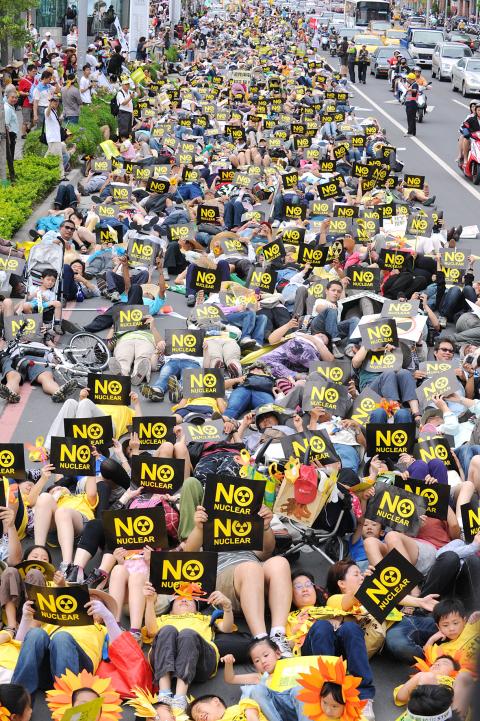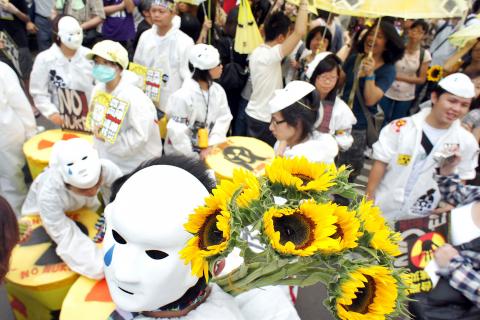Holding yellow banners and clutching sunflowers, thousands took to the streets in Taipei yesterday as part of a nationwide “430 Sunflower No Nuke Action” protest, urging the government to stop construction of the Fourth Nuclear Plant in Gongliao District (貢寮), New Taipei City (新北市), and pursue a more sustainable energy policy.
With “smile at the sun, keep away from nuclear disasters” as the theme of the parade, yellow flowers were picked to symbolize sustainability. Some also held handmade paper windmills, symbolizing green energy and a bright future without the fear of a potential nuclear crisis.
The nation’s anti-nuclear movement gained new momentum in the middle of March after a massive earthquake struck Japan and unleashed a tsunami that damaged the Fukushima Dai-ichi nuclear power plant, causing radiation to be released, which has endangered northeastern Japan’s food and water supplies.

Photo: Huang Chih-yuan, Taipei Times
The disaster resonated especially strongly in Taiwan because, like Japan, it is prone to earthquakes that could lead to scenarios similar to those that crippled the Japanese plant.
People of all ages took part in the carnival-like parade yesterday.
A section of the parade, called the “Keep Away from Nuclear Disaster Division,” was led by about 20 people holding up a long yellow banner with the words “No Nukes” written on it, followed by a group of protesters wearing radiation protection suits to remind people about the potential severity of nuclear disasters.

Photo: CNA
Another section was -comprised mostly of students from several universities.
Young people dressed in colorful clothes danced to music as they shouted anti--nuclear power slogans and paraded through the bustling streets.
“I think the government should replace nuclear power with other safer energy sources,” said a mother surnamed Chang (張), who stood on the sidewalk with other parents and children for a short break during the parade.
She said she wanted her daughter, who is in the first grade, to take part in the parade because they had been taught about nuclear power issues at school, and her daughter was happy to participate.
A student from an Aboriginal Tao village on Orchid Island (蘭嶼), where a nuclear waste storage facility is located, said the Tao people believed that nuclear radiation, which has no form or color, is like evil spirits and must be banished.
This inspired him to wear a traditional Tao warriors helmet made out of paper to symbolize fighting off evil spirits.
A 35-year-old woman surnamed Chen (陳) was dressed in a wedding gown and said that while the government is concerned about the nation’s low fertility rate, “we don’t want to get married and raise our children in such a dangerous environment.”
“After the Fukushima nuclear crisis, I think there are some things that are non-negotiable,” she added.
At one point, the crowd lay on the ground, pretending to be dead, after a simulated nuclear leakage siren sounded.
The display, called “If that day comes,” symbolized the many people that could die in Taiwan if a nuclear crisis were to unfold, the organizer said.
Appealing to the government to map out retirement plans for the nation’s three operational nuclear power plants, to put an end to the construction of the Fourth Nuclear Power Plant and to create a nuclear-free homeland where everyone can live without fear of a nuclear disaster, the protesters shouted slogans such as, “Cherish life, end nuclear power,” and “I want a nuclear-free homeland.”
Their two-and-a-half-hour parade eventually led them to the Presidential Office on Ketagalan Boulevard.
Two Japanese, Ono Saiko and Oga Ayako, who said they were forced to leave their homes in Fukushima Prefecture because of the nuclear crisis, joined the parade in Taipei and shared their thoughts with the crowd.
“The Fukushima nuclear crisis is still going on in Japan; we are not in the mood to find fault with the cause, but we are facing a problem of how are we to protect our next generation,” Saiko said.
She said that she hopes people in Taiwan can join forces with people in Fukushima and take nuclear problems more seriously.
Oga Ayako said she saw “hope and power” in the protest in Taipei, and hopes that the next time they are in Taiwan it will be a nation free from nuclear threats.
Organizers estimated that at least 5,000 people turned out for the protest in Taipei, but no police figure was immediately available.
Additional reporting by AFP and CNA

NO HUMAN ERROR: After the incident, the Coast Guard Administration said it would obtain uncrewed aerial vehicles and vessels to boost its detection capacity Authorities would improve border control to prevent unlawful entry into Taiwan’s waters and safeguard national security, the Mainland Affairs Council (MAC) said yesterday after a Chinese man reached the nation’s coast on an inflatable boat, saying he “defected to freedom.” The man was found on a rubber boat when he was about to set foot on Taiwan at the estuary of Houkeng River (後坑溪) near Taiping Borough (太平) in New Taipei City’s Linkou District (林口), authorities said. The Coast Guard Administration’s (CGA) northern branch said it received a report at 6:30am yesterday morning from the New Taipei City Fire Department about a

IN BEIJING’S FAVOR: A China Coast Guard spokesperson said that the Chinese maritime police would continue to carry out law enforcement activities in waters it claims The Philippines withdrew its coast guard vessel from a South China Sea shoal that has recently been at the center of tensions with Beijing. BRP Teresa Magbanua “was compelled to return to port” from Sabina Shoal (Xianbin Shoal, 仙濱暗沙) due to bad weather, depleted supplies and the need to evacuate personnel requiring medical care, the Philippine Coast Guard (PCG) spokesman Jay Tarriela said yesterday in a post on X. The Philippine vessel “will be in tiptop shape to resume her mission” after it has been resupplied and repaired, Philippine Executive Secretary Lucas Bersamin, who heads the nation’s maritime council, said

CHINA POLICY: At the seventh US-EU Dialogue on China, the two sides issued strong support for Taiwan and condemned China’s actions in the South China Sea The US and EU issued a joint statement on Wednesday supporting Taiwan’s international participation, notably omitting the “one China” policy in a departure from previous similar statements, following high-level talks on China and the Indo-Pacific region. The statement also urged China to show restraint in the Taiwan Strait. US Deputy Secretary of State Kurt Campbell and European External Action Service Secretary-General Stefano Sannino cochaired the seventh US-EU Dialogue on China and the sixth US-EU Indo-Pacific Consultations from Monday to Tuesday. Since the Indo-Pacific consultations were launched in 2021, references to the “one China” policy have appeared in every statement apart from the

More than 500 people on Saturday marched in New York in support of Taiwan’s entry to the UN, significantly more people than previous years. The march, coinciding with the ongoing 79th session of the UN General Assembly, comes close on the heels of growing international discourse regarding the meaning of UN Resolution 2758. Resolution 2758, adopted by the UN General Assembly in 1971, recognizes the People’s Republic of China (PRC) as the “only lawful representative of China.” It resulted in the Republic of China (ROC) losing its seat at the UN to the PRC. Taiwan has since been excluded from